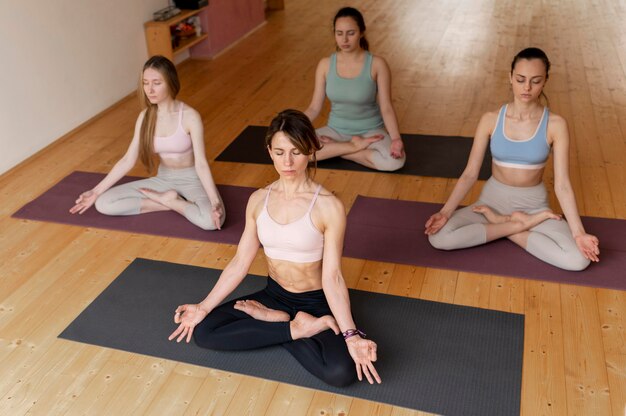
Yoga isn’t just about being flexible; it can also boost memory, heart health, and bone strength, says Anna Magee.
These days, everyone seems to be into yoga, spending a whopping £790 million a year on classes and mats. While some variations of yoga have gotten pretty quirky—think rage yoga, paddle-board yoga, or even dog yoga—the true benefits of yoga are increasingly backed by science.
For example, a study from UCLA found that a three-month yoga and meditation course was more effective than traditional memory exercises at reducing age-related brain decline. Another study showed that yoga could improve sleep for breast cancer survivors.
Lucy Edge, a 53-year-old former advertising exec who struggled with severe depression, turned to yoga instead of medication. After taking six months off to learn yoga in India, she returned feeling happier and more content than ever. She has since written books about her journey and founded Yoga Meds, which lists over 300 clinical trials proving yoga’s benefits for various conditions like arthritis and insomnia.
If all you’ve done for brain health so far are crossword puzzles and Sudoku, it might be time to add some yoga to your routine. The UCLA research involved 12 weeks of yoga and meditation, showing significant improvements in spatial and visual memory, reduced depression and anxiety, and increased stress resilience compared to traditional memory exercises.
Dr. Clare Walton from the Alzheimer’s Society notes that while the study was small, it suggests more research should be done on yoga and meditation for maintaining brain and heart health as we age. The study participants practiced Kundalini yoga, which uses breathing techniques, meditation, and chanting. They also did 20 minutes of Kirtan Kriya daily, a meditation involving chanting, hand movements, and visualizing light.
It’s also common knowledge that activities like walking or jogging are good for heart health, but yoga might be just as beneficial. A 2014 review published in the European Journal of Preventative Cardiology indicated that yoga could lower heart disease risk as much as conventional exercises like brisk walking. Stress, a major contributor to heart disease, can be significantly reduced through yoga, which lowers both blood pressure and heart rate.
Dr. Mike Knapton from the British Heart Foundation highlights that yoga is beneficial for emotional health, helping with conditions like anxiety, stress, and depression, which are common in people who have had heart issues. Previous research also links yoga to improvements in blood pressure, cholesterol, and weight—all risk factors for heart disease.
For those new to yoga, Charlotte Watts, author of “The De-Stress Effect,” has created a series of beginner-friendly, stress-reducing yoga poses. Anna Ashby, a senior teacher at Triyoga Studios, suggests trying Restorative yoga, where postures are held for up to 12 minutes with support, offering a quick way to reduce stress.
Sarah Shone, a physiotherapist and yoga teacher, developed yoga classes for back pain rehabilitation with remarkable success, as 87% of participants reported decreased pain. Yoga is also recommended by the National Institute of Clinical Excellence (NICE) for lower back pain. Yoga can help with incontinence and increase bone density due to its weight-bearing nature, and it can be tailored to suit all abilities.
If you’re just starting, let your teacher know about any health issues and opt for gentler styles like Hatha or Iyengar yoga initially. For specific conditions like back pain, you may be eligible for subsidized yoga through an exercise referral scheme.
A good yoga mat is essential for a smooth practice. If you need to carry your mat often, make sure it’s lightweight and has a comfortable strap. Taller individuals should look for longer mats. Invest in a thicker mat for better joint support.
Healthista recommends the Elephant Cork Yoga Mat from Valka Yoga. It’s eco-friendly, durable, and aesthetically pleasing with a natural rubber base for extra comfort. Cork mats are great for hot yoga since they become grippier with sweat and are naturally antimicrobial and odor-resistant.
Pair this with the matching Elephant Cork Yoga Block from Valka Yoga for better stability and grip during difficult poses. Yin, Restorative, Vinyasa Flow, Iyengar, Anusara, and Yoga Therapy are all great styles to try, depending on your needs and preferences. Each style offers unique benefits and can be adapted to suit beginners and advanced practitioners alike.




